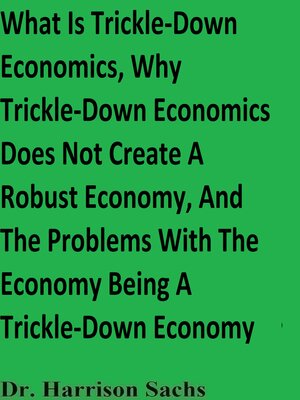What Is Trickle-Down Economics, Why Trickle-Down Economics Does Not Create a Robust Economy, and the Problems With the Economy Being a Trickle-Down Economy
audiobook (Unabridged)
By Dr. Harrison Sachs

Sign up to save your library
With an OverDrive account, you can save your favorite libraries for at-a-glance information about availability. Find out more about OverDrive accounts.
Find this title in Libby, the library reading app by OverDrive.



Search for a digital library with this title
Title found at these libraries:
| Library Name | Distance |
|---|---|
| Loading... |
This audiobook is narrated by a digital voice.
This essay sheds light on what is trickle-down economics, explicates why trickle-down economics does not create a robust economy, and expounds upon the problems with the economy being a trickle-down economy. Trickle-down economics is an economic theory that lacks in efficacy for creating the requisite economic conditions for bringing a robust economy to fruition. The trickle-down theory contends that economic policies that are configured to disproportionately favor companies and the ultra-wealth economic class will culminate in benefiting everyone else. Economic policies that are configured to disproportionately favor companies and the ultra-wealth economic class can help companies to significantly amplify their net income. If companies are able to significantly amplify their net income, then they are able to further amplify the massive compensations that they offer to their executives. Furthermore, if companies are able to significantly amplify their net income, then it is all the more easier for companies to furnish higher dividend payments to their shareholders. The shareholders of companies are investors who are apart of the ultra-wealth economic class. The people who are apart of the ultra-wealth economic class are the shareholders of companies who can choose the board of directors members since they can elect board of directors member with their votes. The election to become a board of directors member transpires during the annual shareholder meeting. The shareholders of a company can change out the company's board of directors if they choose to do so due to having voting power. The board of directors is the board of a company that is responsible for establishing the company's strategic direction and overseeing the company's management. The board of directors can set forth a company's strategic goals. The board of directors can also set forth a company's mission statement and can establish a company's vision statement.







